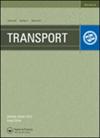公共客运组织模式对系统绩效和服务质量的影响
IF 1.3
4区 工程技术
Q3 TRANSPORTATION SCIENCE & TECHNOLOGY
引用次数: 0
摘要
公共客运系统的组织管理是一个复杂的过程,对系统的功能有重要影响。在全球范围内,PPT的组织模式没有唯一的解决方案,组织模式是根据每个区域的特点进行调整的。PPT的组织模式继承自前南斯拉夫社会主义联邦共和国(SFR)的自我管理系统,在Inđija(塞尔维亚)市变得不可持续,不能以最佳方式满足运输需求和乘客对运输数量和质量的要求。基于欧洲发达城市的积极经验,旧的组织模式被新的现代模式所取代。文章介绍了新的PPT组织模式对系统工作的影响。研究已经进行,以确定新旧系统的组织模式的状态通过计数和采访乘客在2008年和2017年。根据系统的变化,进行了“变化前后”的对比分析,并确定了变化对系统功能和服务质量的影响。结果显示,服务质量显著提高,而运输需求增加了38.3%。本文章由计算机程序翻译,如有差异,请以英文原文为准。
IMPACT OF PUBLIC PASSENGER TRANSPORT ORGANIZATION MODEL ON SYSTEM PERFORMANCE AND SERVICE QUALITY
Organization and management of Public Passenger Transport (PPT) system is a complex process, which significantly impacts the functioning of the system. Globally, there is no unique solution for organization model of PPT, but the organization models are adjusted to the characteristics of each individual area. Organization model of PPT, inherited from the self-management system of the former Socialist Federal Republic (SFR) Yugoslavia, became unsustainable in the Municipality of Inđija (Serbia) and did not fulfil transport needs and demands of passengers regarding the amount of transport and its quality in optimal manner. Old organization model has been replaced by a new modern model, based on positive experiences from developed European cities. Article presents the impact of new organization model of PPT on the work of the system. Research has been conducted in order to determine the state of both old and new system’s organization model by counting and interviewing passengers during years 2008 and 2017. In accordance with the changes made in the system, comparative analysis “before and after changes” has been done along with establishing of the effects of changes on functioning of the system and service quality. Results show significantly improved service quality, while transport demands increase by 38.3%.
求助全文
通过发布文献求助,成功后即可免费获取论文全文。
去求助
来源期刊

Transport
Engineering-Mechanical Engineering
CiteScore
3.40
自引率
5.90%
发文量
19
审稿时长
4 months
期刊介绍:
At present, transport is one of the key branches playing a crucial role in the development of economy. Reliable and properly organized transport services are required for a professional performance of industry, construction and agriculture. The public mood and efficiency of work also largely depend on the valuable functions of a carefully chosen transport system. A steady increase in transportation is accompanied by growing demands for a higher quality of transport services and optimum efficiency of transport performance. Currently, joint efforts taken by the transport experts and governing institutions of the country are required to develop and enhance the performance of the national transport system conducting theoretical and empirical research.
TRANSPORT is an international peer-reviewed journal covering main aspects of transport and providing a source of information for the engineer and the applied scientist.
The journal TRANSPORT publishes articles in the fields of:
transport policy;
fundamentals of the transport system;
technology for carrying passengers and freight using road, railway, inland waterways, sea and air transport;
technology for multimodal transportation and logistics;
loading technology;
roads, railways;
airports, ports, transport terminals;
traffic safety and environment protection;
design, manufacture and exploitation of motor vehicles;
pipeline transport;
transport energetics;
fuels, lubricants and maintenance materials;
teamwork of customs and transport;
transport information technologies;
transport economics and management;
transport standards;
transport educology and history, etc.
 求助内容:
求助内容: 应助结果提醒方式:
应助结果提醒方式:


